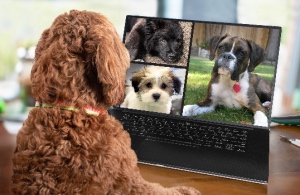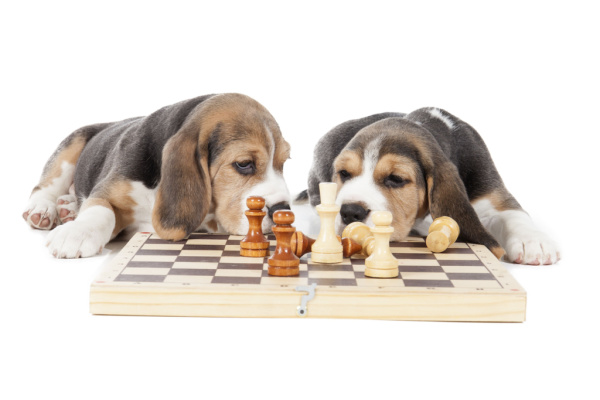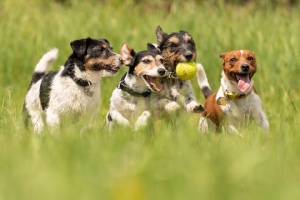
To socialize your dog, introduce it to new people and environments gradually and positively.
More...
Socializing your puppy or dog is essential for their development. This practice helps puppies and dogs grow into well-adjusted, confident, and friendly adult dogs.
It's crucial to introduce your canine to a variety of environments. This exposure helps them become adaptable and less fearful of new experiences.
Moreover, engaging your dog in regular playdates with other dogs promotes healthy social skills and teaches them appropriate ways to interact.
Additionally, incorporating training sessions that include positive reinforcement can significantly enhance your dog's learning process.
Reward-based methods make the training enjoyable and strengthen the bond between you and your pet.
To effectively socialize your canine, start by gradually introducing them to various people and environments under controlled conditions, which helps prevent negative experiences that could impede their social growth.
Following these detailed steps is critical for your furry friend to develop into a friendly, well-behaved dog. Keep in mind that maintaining patience and consistency is crucial during this process.
Early implementation of these practices lays a strong foundation for your dog's future interactions and overall well-being.
This post offers tips on approaching socialization, incorporating strategies that promote positive behaviors and emotional health to ensure holistic development for your dog.

Learn to Socialize Your Dog Early On
Introducing a puppy to early socialization plays a vital role in its growth. It molds its behavior, improves its ability to adapt, and establishes a robust base for continuous learning and future social interactions.
Socialization should begin early in a puppy’s life, ideally between three to sixteen weeks old.
Furthermore, during this formative period, puppies are exceptionally receptive to new experiences that will profoundly influence their future behavior.
Exposing them to a diverse array of people, animals, environments, and situations during this time is pivotal in molding their social skills.
Additionally, integrating cognitive enrichment activities for dogs into their routine can further enhance their mental agility and adaptability.
Moreover, integrating structured play and positive reinforcement techniques can further enhance this socialization process.
By rewarding puppies for good behavior during interactions, they learn to associate socializing with positive outcomes.
This approach not only mitigates potential behavioral issues like aggression or anxiety but also fosters a well-adjusted temperament.
Guide Puppies to Socialize Confidently
It is essential to introduce puppies to various stimuli in a controlled manner gradually.
Overwhelming them with too many new experiences at once can lead to fear and withdrawal, which counteracts the socialization objectives.
However, carefully pacing their exposure ensures they are adequately stimulated and manageable.
Frequently socialize your dog to enhance its adaptability in diverse environments.
Similarly, the commitment to early socialization sets the foundation for a puppy's lifelong behavior and adaptability.
It equips them with the tools to navigate complex social landscapes confidently and calmly as they grow.
Therefore, pet owners must prioritize this critical phase of puppy development to ensure their pets grow into friendly and well-mannered dogs.
Socialize Your Dog With Reward-Based Methods
1. Gradual Introduction: Start by slowly introducing your puppy to new experiences to prevent overwhelming them, which can foster fear rather than curiosity.
2. Reward-Based Reinforcement: Use treats and verbal praise as rewards during social interactions. Consequently, this approach helps puppies associate new encounters with positive outcomes and encourages curiosity over fear.
3. Exposure to Diverse Settings: Frequently introduce your puppy to diverse settings like parks, bustling markets, and dog-friendly cafes. This range of experiences enhances their ability to adapt and feel at ease in different scenarios.
Enhancing Interactions With Humans and Other Animals
1. Broad Human Contact: Introduce your puppy to a wide array of people, including children, adults of all ages, and older people, to help it become comfortable around strangers.
2. Organized Canine Playdates: Schedule playdates with other vaccinated and well-behaved dogs. These sessions are crucial for developing social skills in a controlled setting.
3. Supervised Encounters: Monitor your puppy's interactions and promptly respond to any indications of distress or aggressive behavior.
The Importance of Puppy Classes
Puppy classes offer a structured setting where your dog can learn basic commands while interacting with other dogs.
To effectively socialize your dog, attend these interactive sessions regularly.
Moreover, pet owners should use positive reinforcement classes to support a nurturing learning environment.
Addressing Challenges in Socialization
1. Recognizing Stress Indicators: It is important to identify signs of stress in your dog, such as cowering or growling. If these signs emerge, promptly remove your dog from the stressful situation.
2. Seeking Professional Guidance: If your dog's socialization challenges continue, consult professional trainers or behaviorists who can provide customized advice based on its needs.
Maintaining Social Skills Into Adulthood
Continued socialization is vital as your dog matures. To effectively socialize your dog, regularly visit dog parks or pet-friendly events.
Likewise, keep introducing them to new experiences and maintain regular routines involving interactions with others to ensure they remain well-adjusted.
Optimize Your Dog’s Socialization for Success
Dogs that undergo thorough socialization processes are generally more adaptable and confident and exhibit fewer behavioral problems related to anxiety and aggression.
Committing time and effort to these practices from an early age lays the groundwork for a lifetime of positive social encounters and emotional stability for your canine companion.
Furthermore, well-socialized dogs are typically easier to train and can easily handle new or unexpected situations.
This adaptability also enhances the quality of life of pets and their owners, who can feel more relaxed when bringing them into various social settings.
Continuing this line of thought, we must recognize the essential role of consistent reinforcement in maintaining these social skills throughout a dog's life.

In the Final Analysis
Introducing your dog to varied environments and new experiences strengthens the positive habits formed during early socialization training.
Therefore, this process ensures your dog remains comfortable and confident in ever-changing surroundings.
As you embark on the fulfilling journey of growth and discovery with your furry companion, remember that every interaction influences their perception of the world.
The investment in socialization pays dividends in the form of a well-adjusted, friendly pet capable of navigating complex human environments with poise and enthusiasm.
Furthermore, adequate socialization is crucial for fostering a harmonious relationship between you and your dog.
It sets a solid foundation for them to thrive as loyal, joyful companions.
To maintain these benefits, continue to socialize your dog regularly.
As a result, embrace this transformative process and watch your canine friend grow into their best self, ready to face the world confidently.



